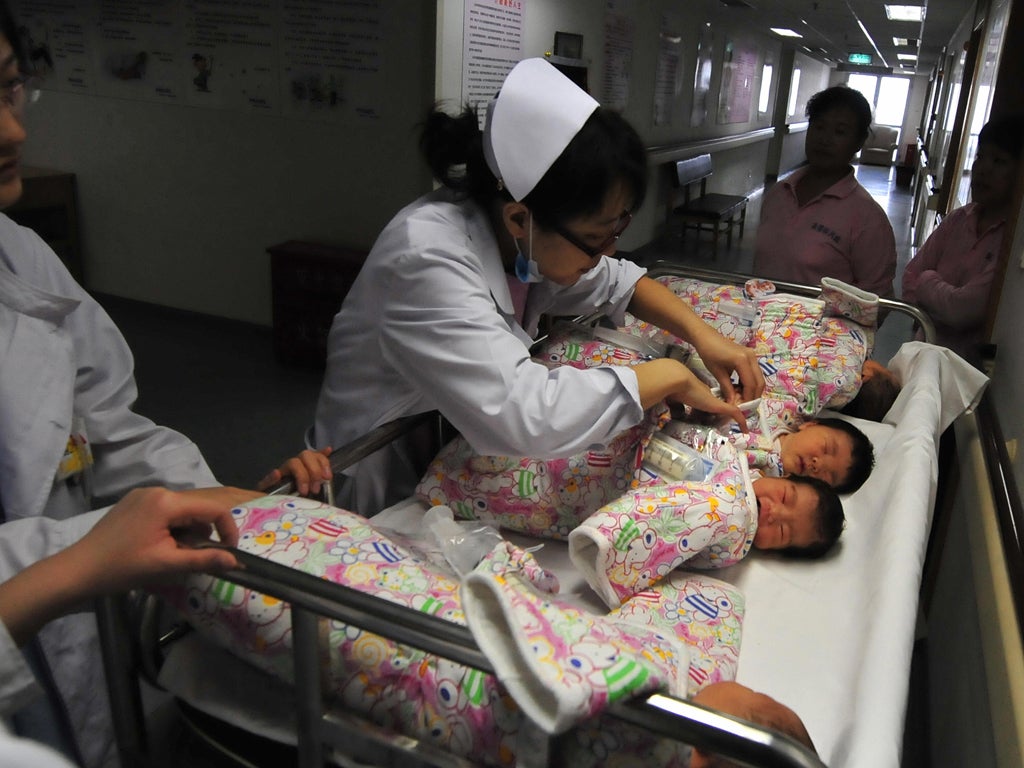Seven breaches of one-child policy put wealthy Chinese couple in line of fire

Your support helps us to tell the story
From reproductive rights to climate change to Big Tech, The Independent is on the ground when the story is developing. Whether it's investigating the financials of Elon Musk's pro-Trump PAC or producing our latest documentary, 'The A Word', which shines a light on the American women fighting for reproductive rights, we know how important it is to parse out the facts from the messaging.
At such a critical moment in US history, we need reporters on the ground. Your donation allows us to keep sending journalists to speak to both sides of the story.
The Independent is trusted by Americans across the entire political spectrum. And unlike many other quality news outlets, we choose not to lock Americans out of our reporting and analysis with paywalls. We believe quality journalism should be available to everyone, paid for by those who can afford it.
Your support makes all the difference.A Chinese couple that flouted the country's infamous one-child law not once but seven times is facing the wrath of the general public amid claims that they are members of a wealthy elite to whom the country's strict reproduction rules do not apply.
The couple, from the booming southern province of Guangdong, had eight children, including five born illegally to surrogates, whereas the official limit stands at one child, with some exceptions that allow for two. Now, after a newspaper reported that they had spent lavishly on assisted reproduction techniques, they are under investigation from the planned birth watchdogs.
The news has caused a scandal in China, where the population control policy is widely disliked, partly because of a sense that the richest are able to circumvent it.
Guangdong provincial health bureau vice deputy chief Liao Xinbo expressed his indignation at the story - and at the use of so many surrogates. “It's like the rich should have the right to reproduce as often as they want,” he said. “It's absolutely wrong. And there is no respect for life. There is a high risk with multiple pregnancies, and there is an ethical problem as well.”
The couple were not identified by name but the Guangzhou Daily newspaper said they were a wealthy couple who had spent nearly one million yuan (£100,000) on IVF (in-vitro fertilisation) and two surrogate mothers. The mother was a successful businesswoman who had been unsuccessful in having children through various medical techniques. The couple tried IVF and were surprised when all eight embryos had been successful, an anonymous source told the paper.
“The couple were anxious to have babies and had no difficulty in affording test-tube babies, surrogates or living expenses, so they decided to keep them all,” he said.
The couple had kept the story a secret but it was revealed when media discovered a picture of the babies — four boys and four girls — taken by a photography studio. They were born in September and October 2010.
The official probe has been widened to examine the whole process of reproductive technology, and 38 clinics are being investigated province-wide to see if there was an illegal trade in eggs and embryos, or the use of sperm from unauthorised sperm banks.
The penalty for breaking the planned birth rules is a fine, and a loss of some benefits such as free education and healthcare, but for many wealthy couples in China, this is a price worth paying. Their children are known as “black children” and they technically have no legal rights.
But many of the better off already opt for private education and healthcare, and don't mind missing out on the chronically underfunded public system.
The Guangdong provincial health bureau said “surrogacy runs counter to the regulations on the management of reproductive technologies issued by the Ministry of Health.”
“We contacted the family by telephone, and the father said they had the babies overseas, not here in China, but we have to get further evidence to determine where they got the babies,” said Xu Qingfeng, director of the education office of the Guangdong provincial health bureau.
China introduced its one-child policy in 1979 to restrict births in the world's most populous nation. According to data, the one-child policy has prevented 400 million people from being added to China's population. It has relaxed the rules somewhat in the past few years and some couples are now allowed to have a second child.
There is also pressure to reform the one-child policy because more than three decades of the scheme have led to a swift ageing of the populace and increased pressure on younger Chinese to care for older residents.
Join our commenting forum
Join thought-provoking conversations, follow other Independent readers and see their replies
Comments